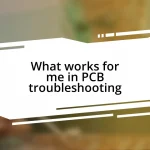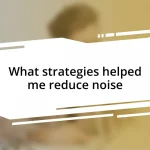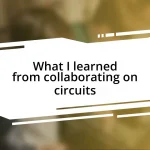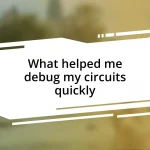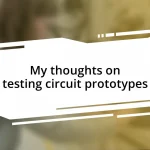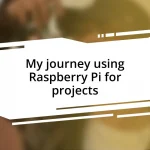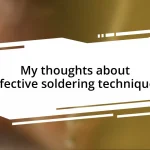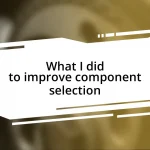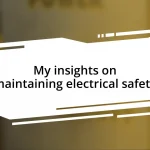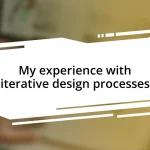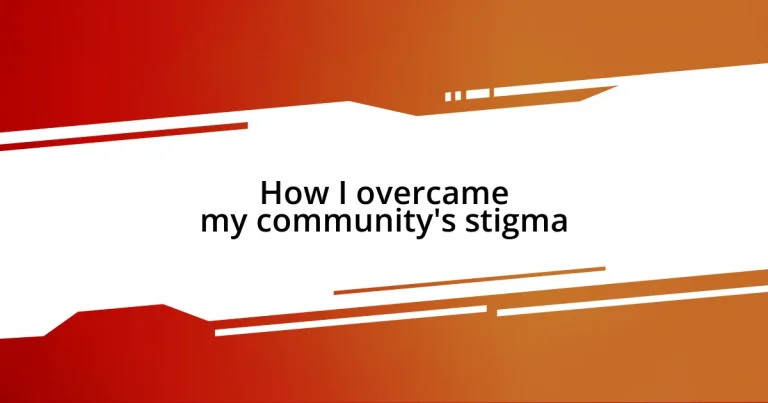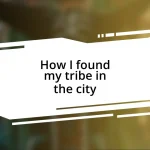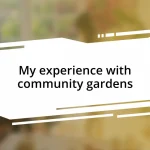Key takeaways:
- Community stigma arises from deep-rooted beliefs and can be challenged through personal storytelling and vulnerability.
- Building a support network, both offline and online, fosters understanding and connection among individuals facing similar struggles.
- Educating others about mental health encourages open dialogues, transforming fear into confidence and empowering individuals to break barriers.
- Creating consistent platforms for sharing experiences, such as community events, nurtures a culture of acceptance and belonging.
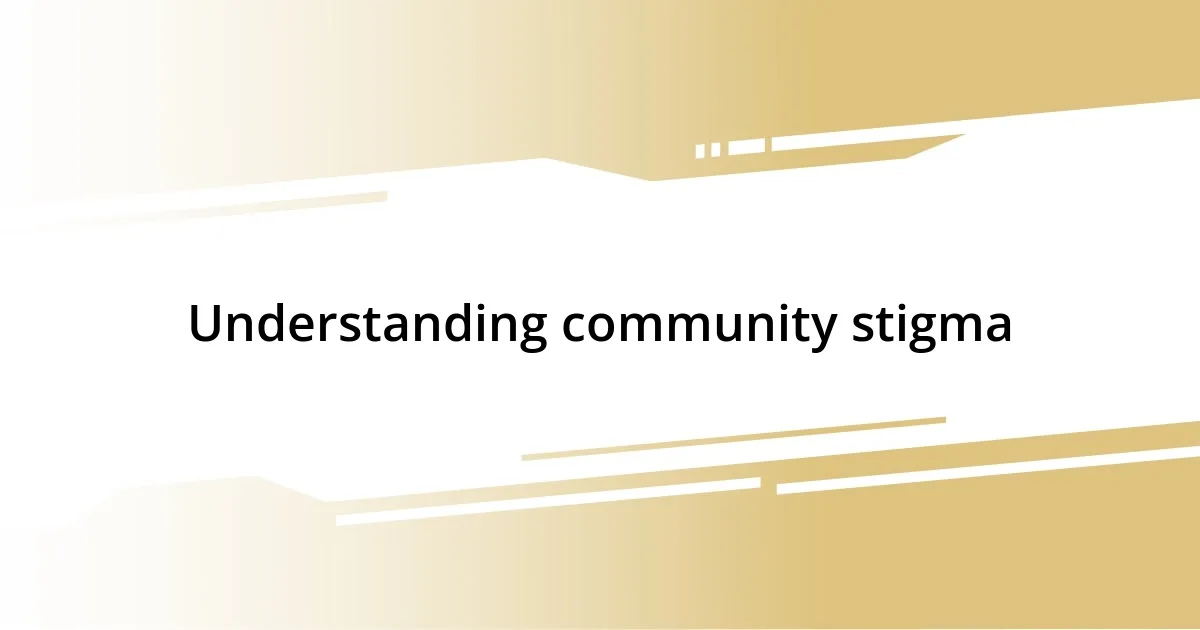
Understanding community stigma
Community stigma often stems from deeply ingrained beliefs and misconceptions about certain groups or identities. I remember feeling the weight of unspoken judgments when I first shared my experiences; it was as if I could hear whispers around me, questioning my worth and my journey. Have you ever felt that heavy silence that follows an unspoken opinion?
Understanding this stigma requires digging deep into our communal psyche. What stories are we carrying from generation to generation? It’s fascinating how narratives can shape perceptions, and I often reflect on how my own story collided with those narratives, challenging the status quo. Each of my encounters with stigma felt like a brick in a wall that needed dismantling, both for me and those around me.
As I engaged in conversations, I discovered that many individuals shared similar feelings of alienation, yet they remained voiceless. I often ask myself: What prevents us from embracing our shared humanity? Perhaps it’s fear, a fear of vulnerability that keeps us from connecting, revealing that the roots of stigma can often be traced back to misunderstanding and lack of personal connection.
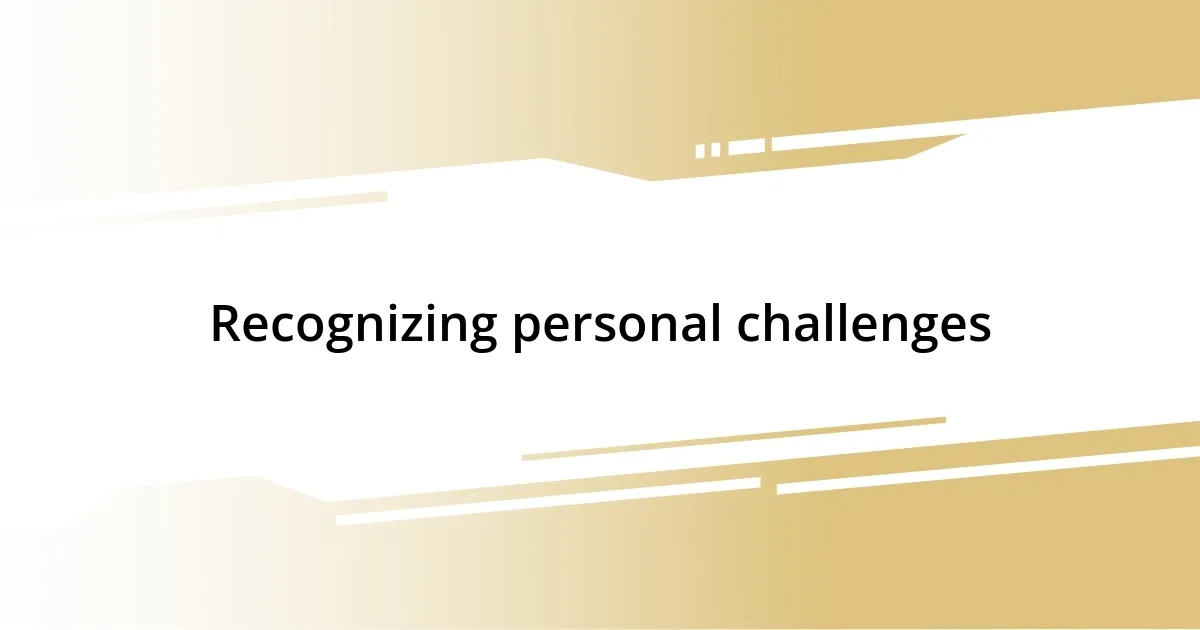
Recognizing personal challenges
Recognizing personal challenges often means facing uncomfortable truths about ourselves. In my journey, I stumbled upon fears I didn’t even know were holding me back. For instance, when I first entered a support group, I was overwhelmed by the realization that my struggles were not unique—I wasn’t alone. That collective experience opened my eyes to the gravity of recognizing and acknowledging my own challenges.
- Identifying feelings: I had to name my feelings, like shame and fear, before I could understand their impact.
- Journaling experiences: I started journaling daily, which helped me pinpoint specific challenges that I brushed aside for too long.
- Seeking feedback: I began asking trusted friends for their perceptions, which often shed light on strengths I hadn’t recognized.
- Acknowledging change: Accepting that change was necessary became a pivotal moment; I could no longer hide from what I needed to confront.
This recognition wasn’t easy; each revelation felt like peeling layers away from an onion, releasing tears I didn’t know I had. Yet every layer revealed something essential about my journey—how personal challenges can redefine us if we dare to face them head-on.
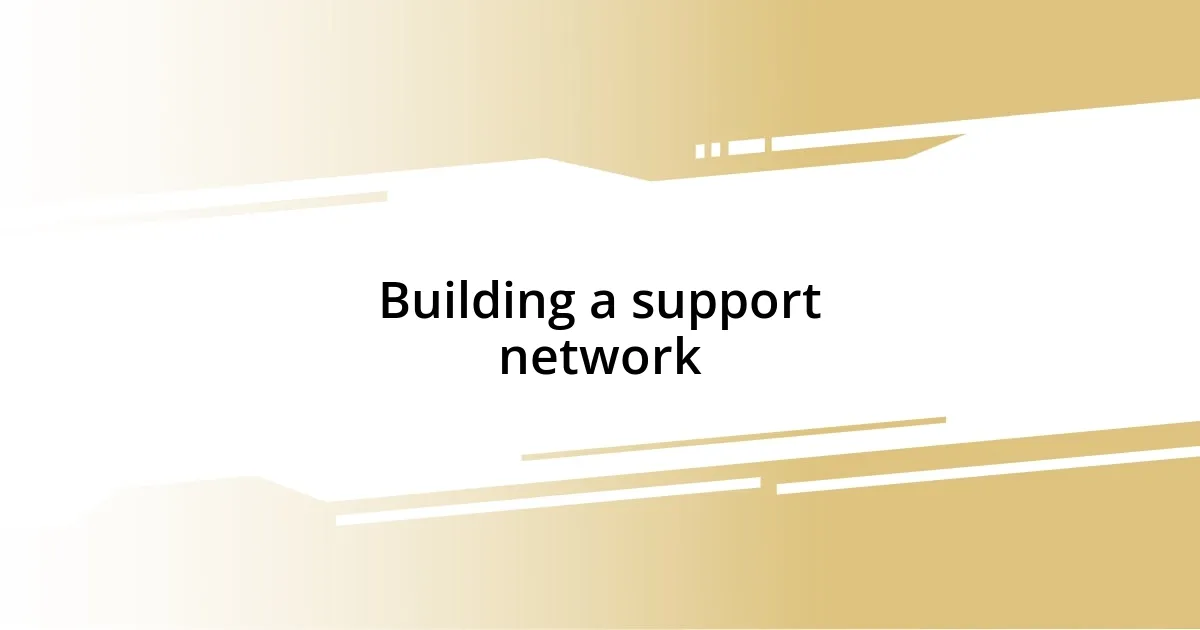
Building a support network
Building a support network is an essential step in overcoming community stigma. I recall the moment when I first reached out to an old friend, sharing my feelings of isolation. To my surprise, she revealed that she had faced similar struggles, and our honest conversation sparked a sense of camaraderie I hadn’t anticipated. It reminded me that vulnerability can forge deep connections; sometimes, all it takes is one person to break the ice.
Creating a supportive environment extends beyond just one-on-one conversations. I found great value in attending local workshops and community events where people shared their journeys. For example, at a community art class, I met individuals who felt alienated like me. Each story they shared was another piece added to my puzzle of understanding. It reinforces the idea that support networks thrive on shared experiences and mutual understanding, helping us feel less alone.
Notably, online platforms also offer tremendous support opportunities. I joined several forums where people discussed their challenges and shared resources. One specific group focused on mental health. I was amazed at how strangers offered encouragement and insights that made me reflect on my own journey. It’s these connections—virtual or in-person—that can profoundly impact our ability to challenge stigma together.
| Type of Support | Benefits |
|---|---|
| One-on-One Conversations | Builds intimacy and trust, encourages vulnerability |
| Community Events | Provides a sense of belonging and shared experiences |
| Online Platforms | Offers anonymity and diverse perspectives, expands reach |
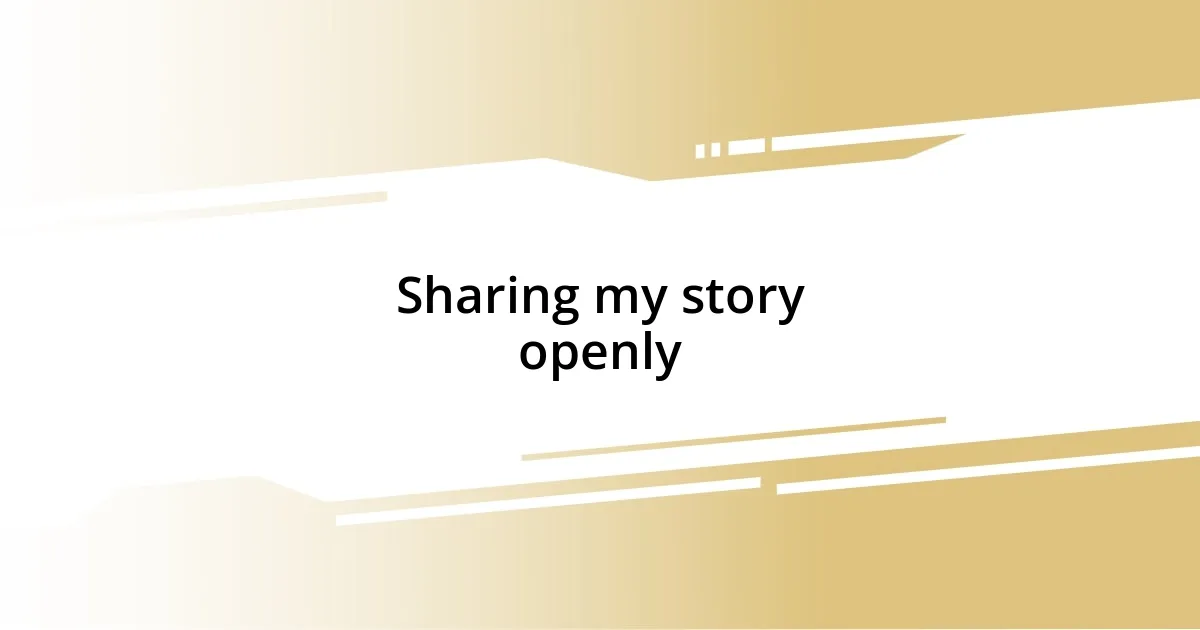
Sharing my story openly
Opening up about my experiences was a daunting task, but I realized that sharing my story was a crucial part of my healing process. The first time I shared my journey at a community meeting, I felt a mixture of fear and relief. Would people judge me? But as I spoke, I noticed nods of understanding, and that moment transformed my anxiety into empowerment. Isn’t it incredible how revealing our truths can resonate with others?
I remember another time when I decided to write my story on a blog. The process was cathartic; the words flowed like a river, carrying both my pain and my triumphs. When I hit ‘publish,’ my heart raced. What if someone criticized me? But the outpouring of support that followed was overwhelming. Comments from strangers who connected with my narrative illuminated how universal our struggles can be. It made me realize, once again, that vulnerability can cultivate strength.
Each time I shared my story, I discovered new facets of understanding—not only about myself but about my community as well. With every conversation, I felt the stigma begin to dissipate; it was as if we were collectively lifting a heavy fog. Have you ever felt that sense of liberation when someone else’s story mirrors your experience? That connection, that shared acknowledgment, fosters a powerful sense of belonging. Sharing my journey wasn’t just about me; it became a bridge for others in the community, leading us toward hope and healing together.
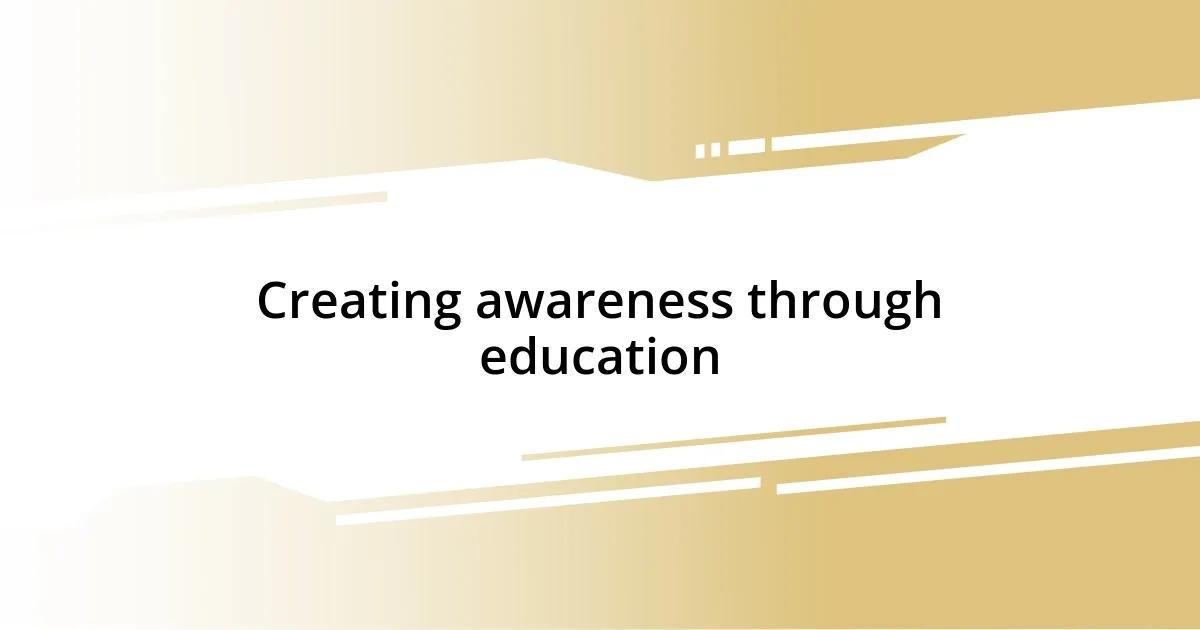
Creating awareness through education
Creating awareness through education is powerful. When I first volunteered to teach a workshop about mental health in my community, I noticed a shift in people’s attitudes. We often overlook the everyday conversations surrounding tough topics, right? I made sure to incorporate simple language and relatable examples. That made a huge difference. Seeing participants’ faces light up as they connected the dots was an experience I’ll always cherish.
One particular moment stands out to me: a participant who shared her fear of discussing mental health with her family. Through the workshop, she learned specific strategies to have those conversations. I could see her confidence grow. It’s moments like these that show me how education can empower individuals to break down barriers. Each discussion led to deeper understanding and practical tools, transforming apprehension into action.
I also encouraged participants to ask questions and share their experiences. It wasn’t just about me teaching; it became a collaborative learning environment. By sharing stories, we created a sense of community. I’ve learned that education isn’t merely about delivering facts; it’s about creating space for dialogue. Have you ever thought about how your own experiences could enlighten others? The realization that we learn best together underscores the importance of awareness through education.
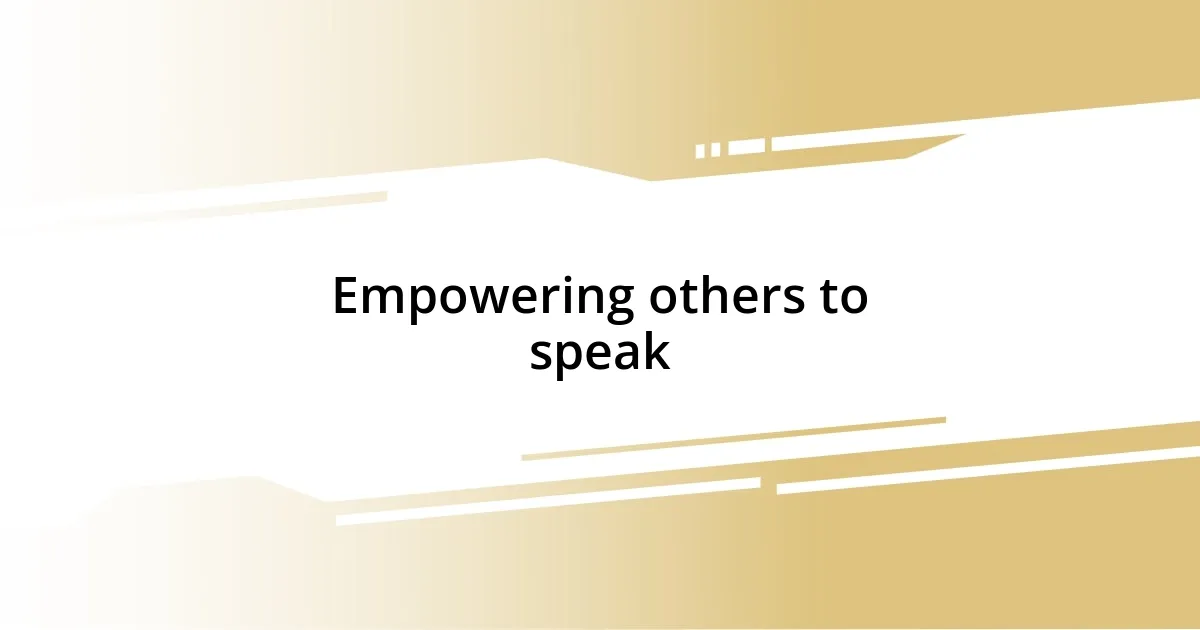
Empowering others to speak
Empowering others to speak is truly transformative. I vividly recall hosting a small gathering intent on creating a safe space for sharing stories. At first, the room was tense; everyone was hesitant to dive in. But then, I shared a personal anecdote about a moment of vulnerability I experienced, and something magical happened. One by one, others began to open up, revealing their struggles. It’s astonishing how one heartfelt disclosure can prompt people to shed their fear and embrace their own voices.
As the discussions flowed, I witnessed an incredible change in the atmosphere. Bonds were forged over shared experiences, and it occurred to me that encouragement is contagious. That’s when I realized the true power of storytelling—not just as a personal release but as a communal act that fosters connection. Have you ever had that moment when a single story made you feel less alone? It’s this shared reflection that encourages others to speak their truth, knowing they are surrounded by empathy.
I later initiated a project where people could anonymously submit their stories. This idea stemmed from my desire to create a platform where fear of judgment wouldn’t hold anyone back. The responses were profound—some were filled with hope and healing, while others were raw and painful. Each submission reminded me of our collective strength. Isn’t it remarkable how, through anonymity, people can find the courage to reveal their most intimate struggles? This practice not only empowered participants but also highlighted the healing power of vulnerability, creating ripples of change throughout our community.
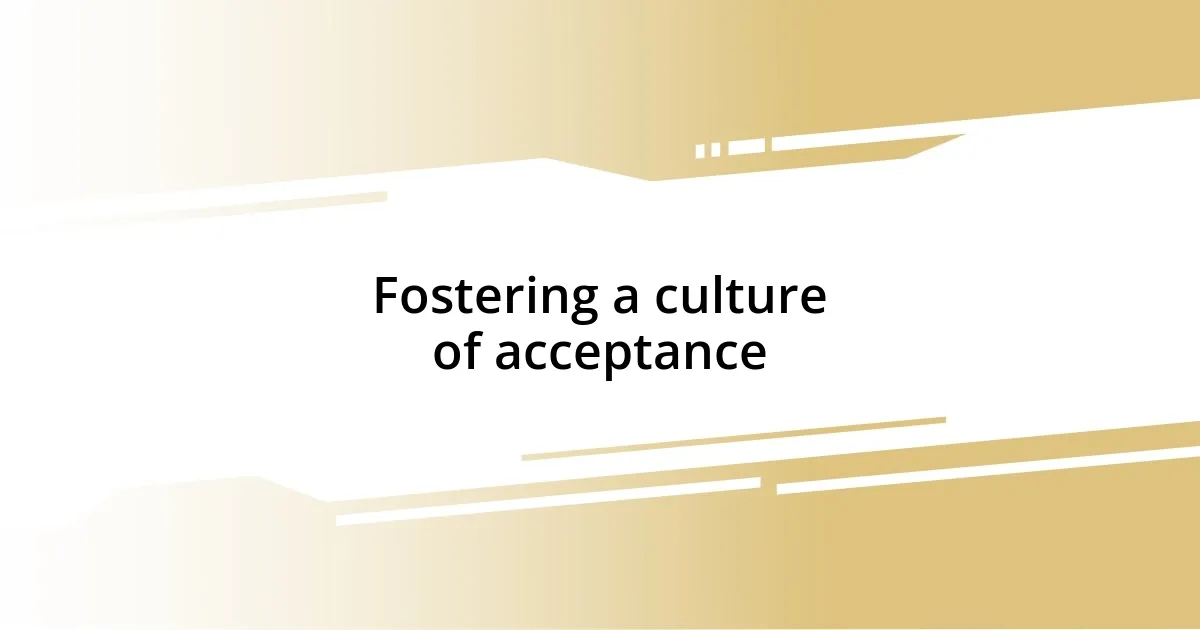
Fostering a culture of acceptance
Fostering a culture of acceptance starts with everyday interactions that validate individual experiences. I remember a chance encounter at a local coffee shop where I overheard a conversation between two friends about mental health. Rather than shying away, I joined in, sharing my own experiences and encouraging them to express their feelings openly. It was a simple yet powerful reminder that acceptance often begins in those seemingly casual moments. How often do we miss opportunities to foster acceptance in daily life simply because we don’t initiate the conversation?
Creating a culture where acceptance thrives requires intentional effort. I often think back to the time I organized a community potluck, where each dish represented a different cultural background. As we shared meals, we also shared stories—everyone felt invited to be themselves. It struck me how food can forge connections that words often struggle to achieve. Did you know that by breaking bread together, we unconsciously lower our defenses? Those small acts of coming together can dramatically shift perceptions, sparking acceptance that resonates beyond that single gathering.
Going beyond one-time events, I’ve found that consistency is key in fostering acceptance. After our potluck, I initiated regular meet-ups to discuss various topics, always encouraging open dialogue. I noticed that with each meeting, the discomfort surrounding certain subjects waned, and people began to show up more authentically. Seeing others share their journeys was incredibly rewarding; it’s a reminder that a supportive community doesn’t form overnight. How can we ensure these conversations continue? By being present and invested in one another’s growth, we nurture an environment of acceptance that celebrates our shared humanity.
